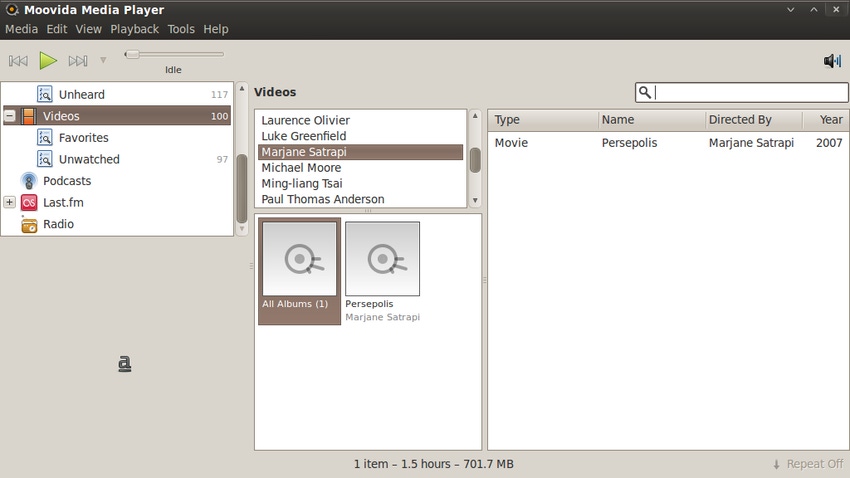
Moovida, a media center application for Ubuntu with a long history, has been undergoing a lot of changes during the last few months. Here’s a look at how the package has been evolving, and how the updates could affect Ubuntu users.
The Linux world has no shortage of applications for playing music and video. Beyond Rhythmbox and Totem, which ship with Ubuntu, popular packages include Banshee, MPlayer and Kaffeine, among others. These programs all have their strengths and weaknesses.
Unfortunately for Ubuntu users, however, the distribution doesn��’t include any true media center applications in the default software stack. Rhythmbox handles only music, and while Totem can play audio and video, it’s not designed for managing large libraries of media files. That’s why third-party media centers like Moovida, which offers a one-stop shop for handling all kinds of multimedia files, are so popular.
Moovida History
Like many open-source projects, Moovida has a bit of a convoluted history. It was launched several years ago by Fluendo, a company that specializes in developing legal multimedia codecs for Linux platforms, under the name Elisa. Elisa initially supported only Windows Linux, but was later ported to other platforms and rechristened Moovida. Back then, the interface was designed with very large screens–like televisions–in mind.
For a while, the Moovida 1.x series enjoyed wide popularity on Ubuntu, and it remains in the repositories through Lucid. In May 2010, however, Fluendo introduced Moovida 2.0, which sports a new interface and is based on the Banshee backend. For now, the older version of Moovida remains available as a free download for various operating systems on Moovida’s website, but it is no longer being actively developed by Fluendo.
Previewing Moovida on Lucid
Moovida 2.0 is officially available only for Windows, but Linux and OS/X builds have been promised. Towards that end, Fluendo introduced a Debian package for a beta version of Moovida 2.0 last spring, and invited Ubuntu users to give feedback and file bug reports. To get a taste of the new Moovida on Ubuntu, I installed the beta build on Ubuntu 10.10 and gave it a go.
Unfortunately, installing Moovida clobbered Banshee, so that was a bit of downside–it would be nice if the two applications were designed to coexist peacefully. Otherwise, however, installation was straightforward.
Moovida’s interface is also pretty simple and uncomplicated–not to mention largely identical to Banshee’s:

Moovida Screenshot

Moovida Screenshot
What sets Moovida apart from Banshee, however, is its rich set of plugins, which can be used to enable a wide range of functionality. Some of the plugins didn’t work correctly when I tested them–the YouTube support, for example, appeared broken–but this will all presumably be sorted out before the final release:

Moovida Plugins
Licensing: Open or Closed?
Notably, plugins for Moovida are licensed separately from the code for the core application, which is available under the GPL. This means add-ons could be developed and sold commercially, under closed-source licenses.
It’s unclear exactly which direction Fluendo plans to take Moovida in in the future, but the company seems likely to take advantage of the plugin framework to release proprietary components. As the developers write (emphasis added):
The Moovida Core UI will use the MIT licenses, and some extensions and services inside it will be proprietary.
To me, that sounds like it means Moovida will not be entirely open-source. This fact may complicate its status for Ubuntu users, ruling it out as a replacement for Rhythmbox/Totem and driving ideologically minded users away.
On the other hand, the flexible nature of the plugin licensing could prove beneficial to Linux users by making it easier for proprietary developers to reach them. Commercial programmers have a tendency to stay away from open-source applications because the viral nature of the GPL often makes it difficult to bring proprietary code anywhere near open-source programs. Moovida might make that barrier a little easier to overcome.
For the time being, though, we can only wait and see what develops, since there’s been little word on when we can expect an official Linux release (the Moovida website promises an OS/X release in summer 2010, but the summer is just about officially over and the Mac build has yet to appear, so development may be running behind schedule).
About the Author(s)
You May Also Like


